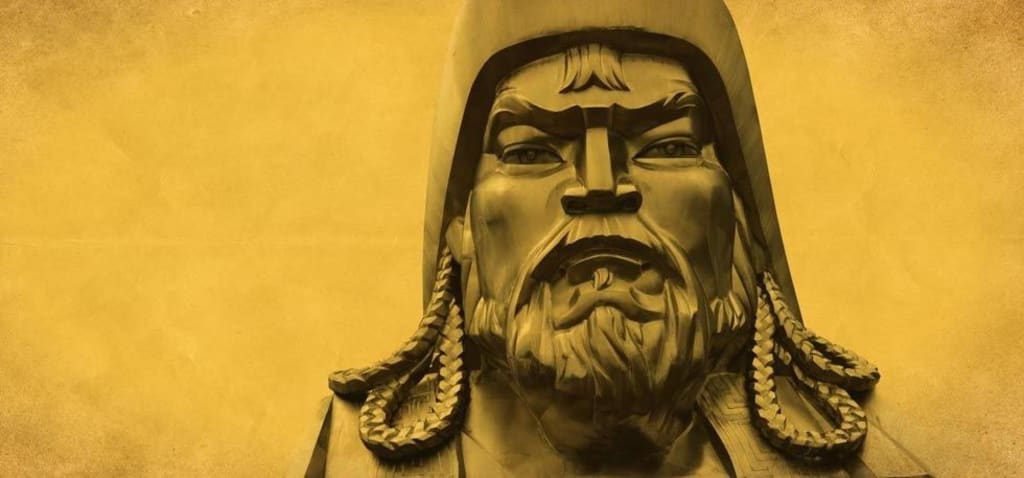Unraveling the Enigma of Genghis Khan
A Complex Legacy of Cruelty and Conquest

Introduction:
Genghis Khan, the enigmatic figure of history, looms large over the annals of time as one of the most formidable and controversial leaders the world has ever known. From the vast expanse of the Mongolian steppes, he rose to become the founder of the largest contiguous empire in history. Yet, his legacy is shrouded in tales of brutality and ruthlessness, leaving behind a complex tapestry of triumph and tragedy. In this exploration, we delve into the life, conquests, and the enigmatic persona of Genghis Khan, seeking to unravel the layers of his legacy.
Early Life and Rise to Power:
Born as Temüjin around 1162, Genghis Khan emerged from humble beginnings amidst the nomadic tribes of the Mongolian steppes. His early life was marked by adversity and turmoil, as his father was poisoned when he was only nine, leaving the family destitute and vulnerable. Temüjin and his family faced constant threats from rival tribes, a harsh reality that forged his resolve and honed his leadership skills from a young age.
Despite the challenges, Temüjin displayed remarkable resilience and cunning, gradually consolidating power and alliances among the disparate Mongol tribes. Through a series of strategic marriages and political maneuvers, he emerged as the undisputed leader of the Mongols, earning the title of Genghis Khan, meaning "universal ruler," in 1206.
Conquests and Expansion:
With his newfound authority, Genghis Khan embarked on a relentless campaign of conquest, laying waste to cities, kingdoms, and empires across Asia and Europe. His military genius and innovative tactics, including the effective use of cavalry and psychological warfare, enabled the Mongol armies to conquer vast territories with astonishing speed and efficiency.
The conquests of Genghis Khan were characterized by unprecedented brutality and devastation. Cities that resisted his rule were subjected to wholesale slaughter, with inhabitants massacred or enslaved, and buildings razed to the ground. The infamous sack of cities like Baghdad and Nishapur became grim reminders of the Khan's merciless wrath, leaving behind a trail of death and destruction.
Cruelty and Ruthlessness:
Genghis Khan's reputation for cruelty and ruthlessness is deeply ingrained in historical accounts, painting a portrait of a leader who brooked no opposition and showed little mercy to his enemies. Tales of his brutality abound, from the execution of captured soldiers to the systematic massacre of civilian populations.
One particularly chilling aspect of Genghis Khan's rule was his use of terror as a tool of conquest. The practice of "scorched earth" warfare, where entire regions were laid waste to intimidate resistance, became a hallmark of Mongol strategy. The Khan's orders were clear: submit or face annihilation, leaving little room for negotiation or compromise.
Despite the brutality of his methods, Genghis Khan was also a pragmatic leader who recognized the value of diplomacy and governance. He established a system of laws known as the Yassa, which governed all aspects of Mongol society, from military service to trade and taxation. Under his rule, the Mongol Empire flourished, fostering trade and cultural exchange across Eurasia.
Legacy and Impact:
Genghis Khan's legacy is a complex and multifaceted one, encompassing both triumph and tragedy. On one hand, he is revered as the founder of a vast empire that stretched from the Pacific Ocean to the shores of the Mediterranean, leaving an indelible mark on the course of history. The Pax Mongolica, a period of relative peace and stability under Mongol rule, facilitated trade and cultural exchange on an unprecedented scale, laying the groundwork for the age of exploration that would follow.
On the other hand, Genghis Khan's legacy is also stained by the blood of millions who perished in his relentless quest for power. The human cost of his conquests cannot be ignored, nor can the suffering inflicted upon countless innocents caught in the path of Mongol expansion.
Conclusion:
In the annals of history, Genghis Khan remains a figure of enduring fascination and controversy. His life and legacy are a testament to the complexities of power, ambition, and the human condition. While his conquests were marked by unparalleled brutality, they also laid the groundwork for a new era of global interconnectedness. Genghis Khan's story serves as a reminder of the enduring impact of individuals on the course of history, for better or for worse.
About the Creator
Sahil Lathwal
I'm Sahil, a passionate writer. My voice weaves stories, emotions, and melodies into an enchanting tapestry. Welcome to my world of creativity and expression. 🎶📝🎤





Comments
There are no comments for this story
Be the first to respond and start the conversation.